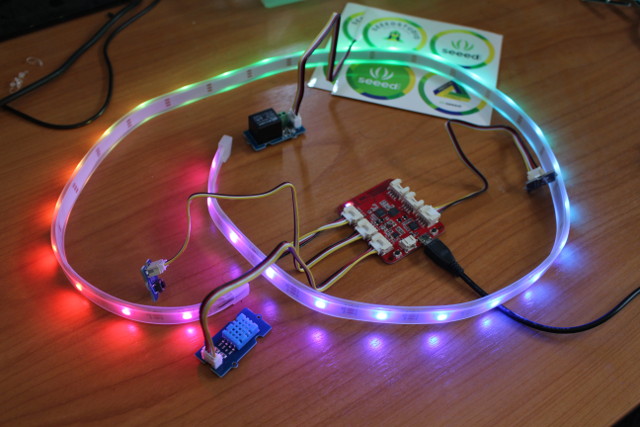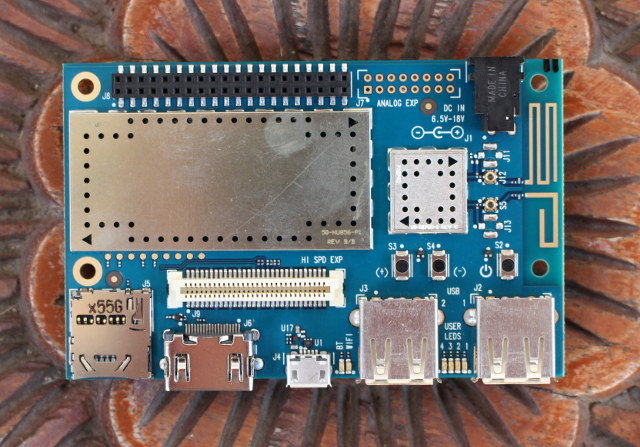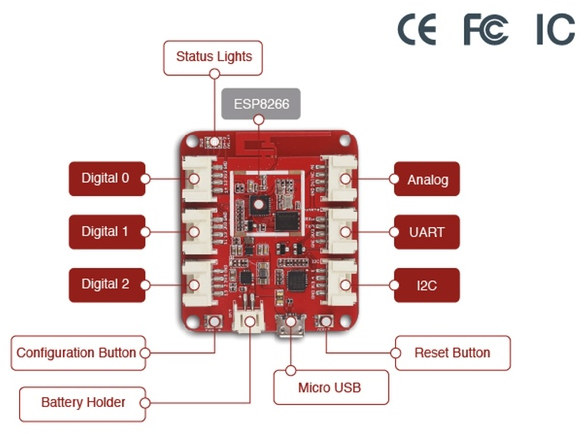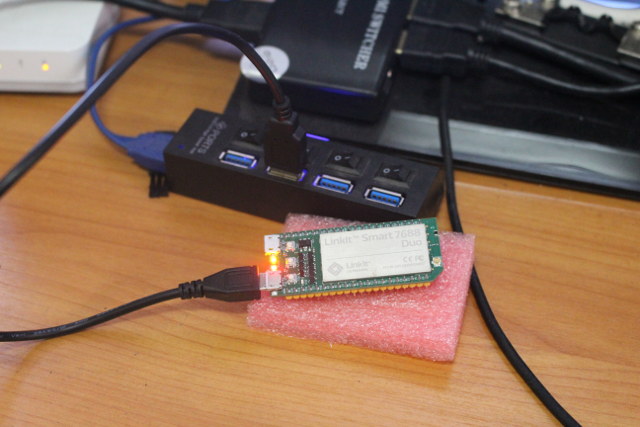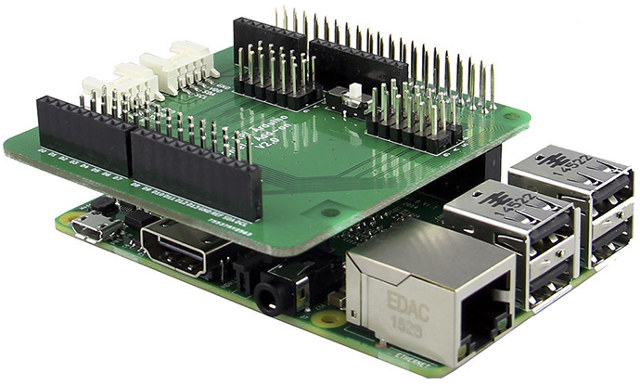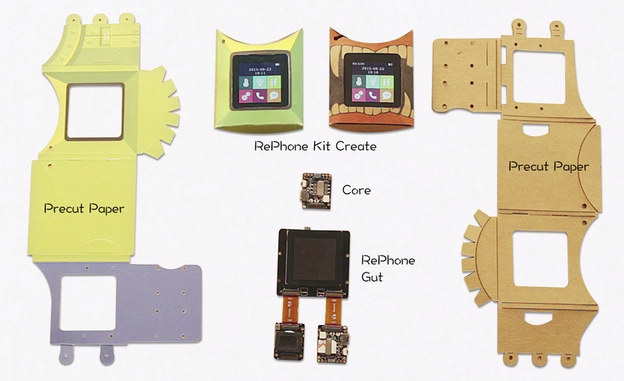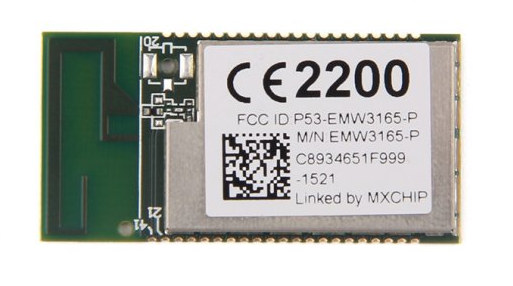After BeagleBone Air, there’s now another BeagleBone Black derived board with WiFi and Bluetooth, as BeagleBone Green gets a wireless version with WiFi 802.11n, Bluetooth 4.1 LE, and four USB ports. BeagleBone Green Wireless Specifications The Ethernet port is also gone, but most of the other specifications remain the same as seen from the comparison table below. BeagleBone Black BeagleBone Green BeagleBone Green Wireless SoC Texas Instruments Sitara AM3358 ARM Cortex-A8 processor @ 1GHz with NEON, PowerVR SGX530 GPU, PRU… System Memory 512MB DDR3 RAM Storage 4GB eMMC flash + micro SD slot USB 1x USB client, 1x USB 2.0 host 1 USB client, 4x USB 2.0 host ports Network Connectivity 10/100M Ethernet Wi-Fi 802.11 b/g/n & Bluetooth 4.1 LE Video Output HDMI N/A Expansion Headers 2×46 pin headers 2×46-pin headers and 2x Grove connectors Debugging 6-pin serial header and unpopulated 20-pin JTAG header Dimensions 86.3 x 53.4 cm Price […]
Getting Started with Wio Link Starter Kit, Visual Programming Android App, and IFTTT
Wio Link is a board based on ESP8266 WiSoC that is supposed to be easy to set up thanks to Grove modules – no breadboard and mesh or wires – and, as I first understood it, to program thanks to a drag-and-drop mobile app that does not require any actual programming. More advanced users can also use a RESTful API in Python, JavaScript, Node.js, PHP, Objective-C or Java. I’ve been sent a $49 Wio Link Starter Kit including the board, a USB cable, and six Grove modules to evaluate the kit. I’ll start by having a look a the kit, before experimenting with the Wio Link Android app. Wio Link Starter Kit Unboxing The kit is sent in a red plastic case. Wio Link board is lodged in the top cover, and other accessories are placed in bags in the main part of the case. Let’s check the board first. […]
Free and Discounted Development Boards: Raspberry Pi 3, DragonBoard 410c, LinkIt ONE and More
Based on the number of comments I get when I organize giveaways, I think people like freebies. I don’t have anything to give away today, but others have launched competitions to win free developments, and Seeed Studio is having a promotional event with some discount on IoT boards. DragonBoard 410c Boards “Maker Month Contest” Qualcomm has declared March as Maker Month, and is asking developer to tell them what they’d make with a DragonBoard 410c board for a chance to win the board and up to $5,000. All you have to do is to submit your idea on DragonBoardContest.com, and every week, the company will give 7 to 10 boards (31 boards in total) to the people with the best ideas as selected by popular vote. The contest has two part: Part 1 – Submit your idea as mentioned above – Open between March 1 and March 31, is open […]
Wio Link is an ESP8266 Board Designed to Make IoT Projects Easier (Crowdfunding)
There are already plenty of board or modules based on Espressif ESP8266 WiFi SoC, but if you don’t like soldering, or would rather avoid breadboards and some cables for your or your kids’ projects, Wio Link may be interesting, as all you need to is to connect Grove modules required for your applications to get started, and Seeed Studio also took care of the low level software part and a drag-and-drop mobile app is provided, so software programming has been made easy too. Wio Link hardware specifications: SoC – Espressif ESP8266EX Tensila SoC Storage – 4MB flash Connectivity – 802.11b/g/n WiFi, with WEP/TKIP/AES encryption support Expansion – 6x Grove connectors: 3x digital, 1x analog, 1x UART and 1x I2C (3.3V I/Os) Power Supply 5V via micro USB port 3.4 ~ 4.2V via external battery Output DC Current – 1000mA MAX Charge Current: 500mA MAX Dimensions – 55mm*48mm Weight – 26g […]
Quick Start Guide for LinkIt Smart 7688 (Duo) Board
Mediatek Labs has announced LinkIt Smart 7688 development boards powered by Mediatek MT7688 WiSoC earlier today, but I was selected for a close beta several weeks before the launch, and I’ve had time to play a little with the boards, so today I’ll report my experience getting started with LinkIt Smart 7688 amd 7688 Duo by writing a Quick Start Guide showing how to setup the boards, upgrade firmware, access the serial console, run “Blink LED” sample applications with Python and JavaScript, as well as the Arduino IDE, and connect to the Internet. Initial Setup You’ll only need a micro USB cable and a computer with WiFi and USB ports to get started with the board. The green LED (top) for the MCU will turn on immediately, while the red LED (bottom) for WiFI will blink once, and only turn on continuously after 5 seconds, and within 30 seconds after […]
$5 Add-on Board for Raspberry Pi Supports Arduino Shields and Grove Modules (with Caveats)
If you have several Arduino shields, you can use them on your Raspberry Pi B+/ Pi 2 board with Cooking Hacks’ Raspberry Pi to Arduino shields connection bridge supported by arduPi library to control I2C, SPI, GPIO, analog inputs, etc.., and sells for $65 on Amazon. Seeed Studio Grove modules have also become more popular, with several new boards integrating 4-pin Grove connectors such as Beaglebone Green. Raspberry Pi boards also support Grove modules, up to 15 of these!, using Grove Pi+ add-on board which the company sells for around $30. But I’ve just discovered a Raspberry Pi to Arduino Expansion Board V2.0 on DealExtreme, selling for $7.97 that’s allows the latest Raspberry Pi boards with a 40-pin headers to take both Arduino shields and 2 Grove modules. After some investigations, I found out it was made by ITead Studio, where they sell it for $5 + shipping. The Wiki […]
RePhone Kit Create is a DIY Phone and Cellular Development Kit (Crowdfunding)
Seeed Studio has design a modular and open source phone it calls RePhone Kit Create. The kit allows you, or/and your kid(s), to assemble their own phone based on building blocks including a 2G or 3G core module, a touchscreen display module, an audio module, and pre-cut, seawable, washable, and easily drawable Kraft paper to make the case. The kit can also be used for IoT applications using cellular and Bluetooth connectivity, and extra Xadow modules GPS, NFC, motion sensors, camera and more.. Two cellular “core” module can be used: RePhone GSM + BLE module with the “world’s smallest System-on-Chip (SOC) for Wearables and Internet Of Things”, GSM, GPRS and Bluetooth 2.1 and 4.0 support. RePhone Core Module 3G with a “powerful microcontroller”,a standard Xadow interface (USB, GPIO, I2C, SPI, UART, EINT), support for speaker, two microphones and a headset, a Nano SIM, and support for HSPA/WCDMA:850/1900 and GPRS/EDGE:850/1900. Voltage: […]
MXCHIP EMW3165 is an $8 CE/FCC Certified WiFi Module with an STM32F4 Cortex M4 MCU
A few months ago, Seeed Studio started selling MXCHIP EMW3162 Wi-Fi module with a STM32F2 Cortex M3 MCU clocked at 120Mhz for $9.95. It’s more capable than ESP8266 modules but also around 3 times more expensive. The company has now launched another WiFi module called MXCHIP EMW3165 with an STM32F4 Cortex M4 MCU @ 100 MHz, FCC certification, and listed for $7.95. EMW3165 module specifications: MCU – STMicro STM32F411CE ARM Cortex M4 micro-controller @ 100 MHz with 512KB flash, 128KB RAM, DSP, and FPU Storage – 2MB SPI flash Wi-Fi connectivity 802.11b, 802.11g, 802.11n (single stream) WEP, WPA/WPA2 PSK/Enterprise 16.5dBm@11b; 14.5dBm@11g; 13.5dBm@11n Receiver Sensitivity – 87 dBm Station, Soft AP and Wi-Fi direct Support EasyLink On-board PCB antenna (EMW3165-P model) or IPEX connector for external antenna (EMW3165-E model) CE & FCC compliant Peripherals: 22 GPIOs USART, I2C ADC, DAC Timer/PWM JTAG/SWD debug interface Connectors – 1×20 + 1x 21 half-through […]



